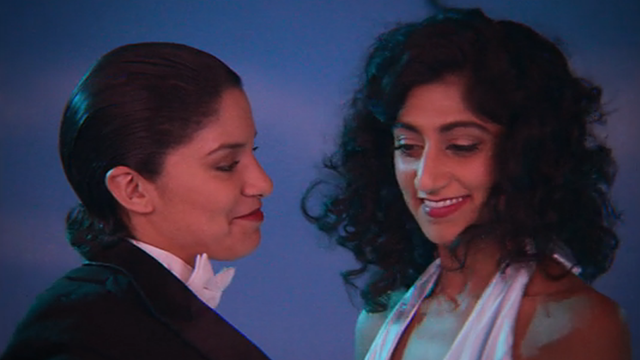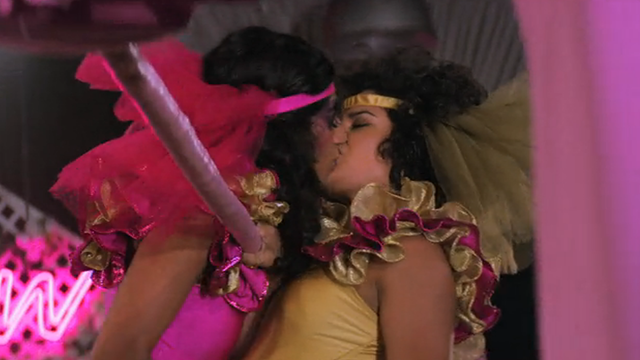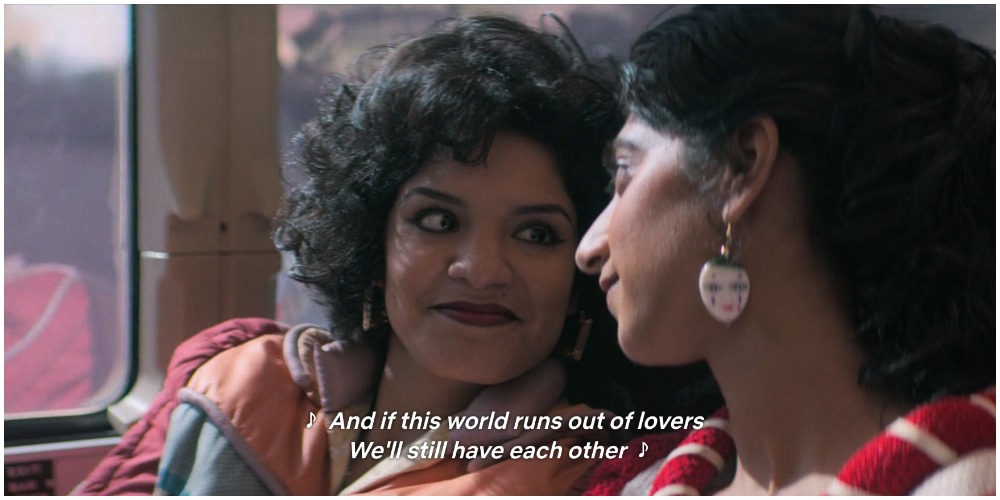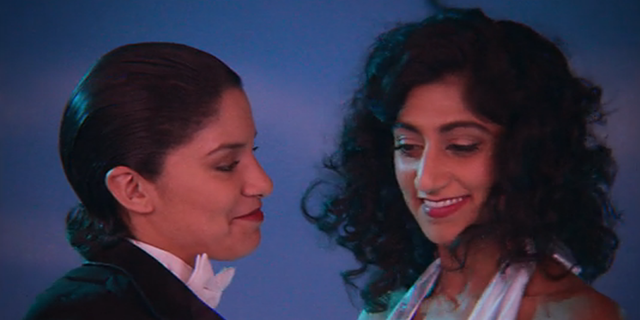This post was written by Riese and Heather
Caution: Many spoilers below for Season Two of GLOW!
Last week Netflix dropped season two of its much loved ladies’ wrestling dramedy, GLOW, and we were very excited about it this time because we knew going in they’d finally added a legitimate queer character to the mix! Her name is Yolanda, aka Yo-Yo, a Mexican American dancer/stripper who replaced Cherry, an actress who took a shot at starring in a TV show at the end of last season. Another queer woman of color on TV? Yes! What we didn’t expect was for GLOW to add a second queer character; another queer woman of color, in fact. Over the course of Season Two, Mad Bomber Arthie Premkumar, the Indian-American med student who joined the circuit last season because she was strapped for cash, realized that hey, she’s gay too — and she’s got some feelings for Yolonda.
I wouldn’t call them “main characters,” really; their queer storylines don’t take up a whole lot of time over the course of the season’s ten episodes, but the moments they do share are sweet and fun and they feel real in your guts.
Below Riese and I chat about this glorious couple, our hopes and dreams for their future, and whether or not GLOW should tackle the tougher gay topics of the ’80s.
Heather: I think you and I felt the same way about Season One of GLOW, which is that we’re always annoyed at TV shows that don’t have lesbian or bisexual characters, but when it’s an entire ensemble of basically only women and it’s on Netflix of all places, what in the world, man? Come on!
Riese: Yeah it was BANANAS. Plus it’s a Jenji Kohan production. That’s what made Erin’s post I LOVE THAT HETEROSEXUAL SHOW GLOW! so perfect, is that this is the kind of show that twenty years ago would be entirely subtext but guess what ladies it’s 2017, you cannot have that many women in shiny leotards grabbing each other’s inner thighs without anybody being gay. That’s homophobic. My resentment of their failure to deliver me a lesbian clouded my ability to truly enjoy Season One. I’ve already watched Season Two twice.
Heather: Let’s just jump right in with Yolanda because the show jumped right in with Yolanda. I love a good coming out story as much as any other lesbian of a certain age who never saw coming out stories when she was a child, but I appreciated that they just got Yolanda’s sexuality out of the way right away. She’s confident about it, honestly to the point of brashness, which I particularly liked because it makes sense in the context of this show in the ’80s in the sports world — which, outside of the WNBA and MLS, is still frankly homophobic as hell — for someone who’s out to overcompensate by being OUT.

Riese: I don’t know that I’d categorize this show as being part of the sports world, I think of it more as live theater? They do have storylines, and modern-day pro wrestling has some gay stuff although apparently it’s not done very well, necessarily. But otherwise I agree! I appreciated this too. It also made room for Arthie to have that arc instead — subtly, but authentically. I loved Yolanda’s unapologetic pride. It wasn’t what I expected and it was refreshing.
Heather: When a supporting character reveals their sexuality on the show, I’m always looking at the main character to see how they react because that’s how most audience members take their cue on how to react. Ruth acted weird about it, which bummed me out, but then she turned it around by learning the lesson that lesbians are fun and not trying to have sex with every single woman they see, which was… fine. I’m glad everyone else was chill about it.
Riese: See, I didn’t feel like Ruth was weird about it at all! Unless I missed something? I thought Ruth was just experiencing weird but primarily positive feelings because she’d assumed that Yolanda had got there through Sam’s bed, and was obviously wrong, and was dealing with that.
Heather: Oh, you know, that’s a good point. Maybe I was over-reading. I’ve actually read some critics saying they wish everyone — especially the management — had pushed back more against Yolanda to make it more realistic. One of the real life ladies of GLOW, Tiffany Melon, for example said she left the pro wrestling circuit because she was harassed for being a suspected lesbian. I’ve also read some critics saying they’d like the show to go into more detail about the AIDS crisis in the ’80s. I, frankly, do not want either of those things, especially the AIDS angle because I don’t trust GLOW to do it well or right. Their tiptoeing around it this season was enough for me.
Riese: I agree, I do not want either of those things. As for the AIDS crisis specifically — I don’t think any of these characters, especially Bash, are equipped to carry a story on this topic in a way that’d feel authentic or dialed in to reality. I think the attention paid to it was an adequate amount of attention for the situation (the death of Bashs’ butler) and I did not want more. It did feel they were planting seeds for a future exploration, however, which would make sense — the first diagnosed AIDS case was in 1981, so we’re relatively early into the crisis at this point, in 1985 —although 1985 was a huge year. 1985 is when amfAR was founded, when the first HIV antibody test was made available, when Reagan said the word “AIDS” for the first time and when Rock Hudson died of AIDS, considered a big turning point w/r/t “elevating the urgency of the epidemic.” Still it seems too early for any of these characters to be able to say anything intelligent about it, and I think it’d be hard for a layman viewer to know enough about attitudes surrounding the spread of HIV at that specific moment in time for them to evaluate whether any given characters’ feelings about HIV/AIDS were appropriate for the time and place, or whether they reflect moral or ethical shortcomings. So I don’t think it would add to character development at all.
Heather: Yes, I agree, and this is huge for me. One of the thing that drives me the most bonkers about period TV is when the attitudes of the current time period shoehorn themselves into the story, through characters or dialogue or even just the camera winking at us. It’s one of the things that made Netflix’s Anne of Green Gables rebeoot unwatchable! That kind of moral superiority from this side of the TV decades in the future destroys fictional worlds. But anyway: Yolanda!
Riese: I’d assumed they were going to do a Tiffany Mellon storyline with Yolanda, like that was part of why she was there. But I liked Yolanda so much and was like, please don’t do the Tiffany Mellon storyline with this precious angel!!! So I’m glad they didn’t — but also, Tiffany Mellon was not a lesbian! I don’t even know if she was bisexual or otherwise interested in women at all? She did girl-on-girl porn eventually, and worked in lesbian strip clubs, but only dated men as far as I know. I think she may have been straight and annoyed that they were so suspicious that she was a lesbian.
Anyhow, I feel like there’s a perception today that prior to ten years ago, literally everyone was homophobic, which’s partially ‘cause yeah sure! But also because the homophobia stories are the only ones that seem to get told. It’s true that lesbians faced (and still face) rejection and violence, and much moreso back then than they do now. But here and there, accepting environments and people did exist, and a lot of those enclaves were in LA! There were people who were out in their personal lives, if not publicly. It’s funny to read books by lesbians written post-1970s about lesbian life because every one of them is like WOW THINGS ARE SO MUCH BETTER NOW THAN THEY WERE!!! WE NEVER DREAMED WE’D BE AS ACCEPTED AS WE ARE TODAY! WE CAN TEACH IN SCHOOLS! G-D GAVE US XENA!!! And it’s like JUST YOU WAIT, LADIES, JUST YOU WAIT. Which is just to say that some people in the right place a the right time did feel like things were wildly better than they’d ever dreamed they could be. Parts of LA were like that, even if you couldn’t be out professionally yet at all. West Hollywood became its own city in 1984, boasting the first openly lesbian mayor and the first-ever city council with a gay majority. This show is set in 1985. This is a group mostly of self-declared outcasts. So I’m glad that they went ahead with people being okay and accepting, it wasn’t inaccurate and I also don’t need to see another rejection story.

So I think it’s realistic that many of her peers would actually be cool with it. However I’m not clear on who knows specifically. Sam and the girls know, but the network guy doesn’t, right? I guess the strip club owner knows, but we’ll have to wait ’til next year to see if there’s pushback on that once they get to Vegas. I imagine there will be.
The kiss with Arthie, however — was that not filmed? Like, what?!!? That was not a thing you could do on television!
Heather: Right, like, even if the culture of professional wrestling — inside professional wrestling was the most forward-thinking, accepting place on earth — the audience for professional wrestling is the same as the NASCAR audience, for the most part, by which I mean: rural Republicans. If that kiss showed up on TV, there would have been riots in the streets!
Oh, but Arthie. Arthie! I am such a fan of stories where the person who’s deeply uncomfortable with the openly gay character is: a) actually gay, and b) falling in love with the person they’re being mean to. Paige McCullers, just for one obsession/example. So I loved this little storyline. It feels so real to me, like that viral tweet by that girl who said she didn’t know how to handle her gay feelings for her friend in middle school so she put a note in her locker that said “Get out of my school!”
Riese: That’s adorable! Internalized homophobia is a bitch, you know?
Heather: I liked when they kissed, but I loved when they danced. I love seeing women dance together. Neither of them had enough screen-time, but that part made me swoon.

Riese: I loved it too, because it showed that Yolanda looks hot in unitards, and also in tuxedos. Also POC/POC relationships are so rare in television so as many screengrabs as we can get of these two, the better.
Heather: What do you wish season two had done better w/r/t Yolanda and Arthie?
Riese: GLOW is … too short. I wish they’d had more time. With an ensemble this big and diverse, the episodes really need to be twice as long, ‘cause there wasn’t much room for anybody to have a meaningful storyline aside from Ruth, Debbie and Sam. However, the one episode that took a genuine break from those three for another character, Mother of All Matches, was the season’s best by far, and I’d like to see more of that. I want GLOW to do more storylines that aren’t centered on Ruth, Debbie and Sam. For example: Yolanda and Arthie!
Heather: Mmm hmm, same. I actually don’t mind the shorter episodes, but I wish there were twice as many. That’d still be less eps than a standard network comedy. It’s doable! And then the writers and the camera could spread the love around. What do you hope happens for them in Season Three?
Riese: I imagine there’ll be some conflict around them being an actual gay couple, once they get to Vegas. So I hope that when this happens, it doesn’t employ any of the tropes I hate. Like, please don’t have Arthie’s inevitably homophobic parents come try to extract her from GLOW because she caught the gay, or have Arthie get scared of being gay and dump Yolanda for a boyfriend she can barely tolerate. That’s where I’m at now: you don’t even need to do something I like, just don’t do anything I hate, okay? What do you want for them?
Heather: I would honestly really just love to see them in love and navigating this wild wrestling world, and the city of Las Vegas, as a queer couple in 1985. I’ve been watching Brooklyn Nine-Nine and I was sort of aware of it when I was watching in real time, but I didn’t fully get it until I was marathoning it that the show did an exemplary job putting Jake and Amy together and keeping them together. Their will they/won’t they arcs were fun, but also they’ve gotten more fun as characters as a couple, and their coupledom itself is its own character. Their togetherness opened up so many more storytelling opportunities. So it can be done! In a comedy! It can be done to have a happy couple in a comedy who have trials and tribulations and grow by themselves and with each other and also are exciting to watch!








Comments
I respect the hell out of both of you but like … I completely disagree. With GLOW I really don’t gaf about historical accuracy whatever I just want fluffy sappy queer love.
Gimme the cute queer storyline where everybody is like “oh they’re cute I don’t care” because I’ve seen enough queer characters suffer on tv for a lifetime.
wait how is that a disagreement? we both said we didn’t agree with criticisms about historical accuracy, we just wanted the queer love story…
Nah you’re right, sorry. I take it back. My brain was mush after a hard shitty day at work and my reading skills went down the crapper
Sorryyyy love you xxx
hahaha xo
“Their will they/won’t they arcs were fun, but also they’ve gotten more fun as characters as a couple, and their coupledom itself is its own character. Their togetherness opened up so many more storytelling opportunities. So it can be done! In a comedy! It can be done to have a happy couple in a comedy who have trials and tribulations and grow by themselves and with each other and also are exciting to watch!”
Y E S. I’ve had enough of the will they/won’t they that has to last until the very end of the series. It gets old. Relationships are complicated to write and to act but do it anyway, writers!
AGREED.
And anyway, this show already has a will they/won’t they couple, and it’s obviously Ruth and Debbie (whether you ship them as friends or lovers).
“Like, please don’t have Arthie’s inevitably homophobic parents come try to extract her from GLOW because she caught the gay, or have Arthie get scared of being gay and dump Yolanda for a boyfriend she can barely tolerate.”
I don’t think that this will happen. There was that moment in the hospital where Arthie talks to Sam about quitting med school because that was something her parents wanted, not her. I feel that Arthie is past that point where she’s doing things to please others, or being afraid to pursue what she wants.
Bash pissed me off. I thought the whole being physically uncomfortable in a gay club and washing down his entire house was all gonna be internalized homophobia and he would figure out he was gay. When he went home and looked at his mirror full of wrestlers I thought that was going to be a realization, but then they shoehorned in that he was in love with Rhonda last minute and I thought it was a very weird choice from the writers, and it felt forced. I know they’re not equipped to handle the AIDS epidemic, but the little they did pissed me off, because they kind of just used it to make a character I liked unlikeable. I thought it was his internal conflict figuring out his sexuality, turns out it was just a homophobic straight man. Oh, well.
I wonder if I completely misread the situation but I was sure in season 1 that he and the “butler” were partners and that they used the Butler thing as a cover. And then this season he kept pretending his “Butler” had left over employment row but that it was cover for “my boyfriend left me because I keep calling him my butler”.
I took his reaction over the AIDS thing as him being terrified of having gotten it too from the sex he was having with his “butler”
I thought his telling Rhonda he loves her is because he needs a beard so he can keep pretending he’s straight?
Idk I now maybe have to rewatch the whole thing
That was how I read it too, Chloe
Valeria, I think you misread Bash’s actions in the final episode. I really don’t think he’s in love with Rhonda at all – as you said, it came out of nowhere. What didn’t come out of nowhere, though, was his extreme internalized homophobia. We know that came from his mother (and society at large obviously) and we’ve seen many examples of it. Marrying Rhonda was just another example. I really think he was trying to convince himself he wasn’t gay, or to prove to the rest of the world that he wasn’t gay, or to bury that part of himself so far down that no one could ever find it and he could just forget about it. My heart BROKE for Bash this season. Nothing in that final episode said to me “straight man makes desperate last attempt to marry the woman he loves before she marries another man”. To me, that episode positive screamed “deeply closeted gay man makes desperate attempt to prove to himself and the rest of the world that he is not gay because how can he be gay if he loves and marries this beautiful woman?”
YMMV, but I would bet a lot of money that they’re going to delve more deeply into Bash’s sexuality and internalized response to it next season.
I also read the marriage proposal as an attempt to prove his heterosexuality to himself. I think if the writers wanted to sell that his professed feelings for Rhonda were real, they’d have hinted at it before or at least shown some kind of friendship between them
How did everyone feel about Debbie’s reaction to Ruth running away from the awful tv exec? Because i thought that was so in character and im really glad that showed that ‘opinion’, which is obviously bloody wrong, but just felt so right for the time and character. Anyways, i thought it was a good example of the writers not shoehorning current views into historical characters mouths.
Also, yolanda though. <3 what a bloody hero. I felt the arthie/yolanda storyline was a little brief. But yolanda was still able to be a full real character despite that.
That scene was hard to watch but it felt spot on for her character. It was that “I’ve been there and done that and I dealt with it so why couldn’t you” anger, which is understandable even if it is awful.
Oh god, agreed. Debbie was awful, and it was so hard to watch Ruth have to experience both the action itself, and then Debbie’s reaction. And that, moreso than the broken ankle, was what flipped my brain from “Ruth did something terrible to Debbie” to “Debbie has been torturing her way long enough and now she’s the one who’s got to apologize.”
Controversial opinion, but I don’t think this season was as good as the first. Don’t get me wrong, I really loved season 2, but I LOVED LOVED LOVED season one. Yeah, the absence of any queer women bummed me out, but the show itself was so incredible I could forgive that by imagining that any of the women we didn’t get to know all that well in season one were queer and just the audience didn’t know yet, because we never really spent much time with any of them other than Ruth and Debbie. And I was right! (Still 100% ship Ruth and Debbie though, #sorrynotsorry).
Riese, I agree with you that I think Mother of All Matches was the best episode of the season, and I really hope the takeaway from that is the show needs to explore non-Ruth/Debbie/Sam characters more. I really want a Mel Rose episode – she seems so one-dimensional but I bet there’s some super interesting stuff underneath that! And obviously more Arthie/Yolanda! I also lowed Perverts Are People, Too, but obviously for very different reasons. It reminded me of Ruth’s abortion last season, in that I was cringing for how they were gonna handle it, and they wound up doing it almost perfectly.
I worry about the show handling a larger AIDS storyline too, but based on how they’ve handled possible land mines like abortion and sexual assault, I’m willing to give them the benefit of the doubt on that one. I really, really loved Bash’s storyline this season, my heart BROKE for him when he got the call about Florian, and watching him trying to break down outside while his home was being bleached. I do worry (and based on some comments I’ve seen here and elsewhere, I’m right to worry) that perhaps the writers were a bit TOO subtle with that, and I really hope they explore it more in the next season. I obviously want this show to be primarily about the women, but I think there’s a really interesting story that can be told with Bash, which will now likely fold in Carmen and Rhonda as well.
I loved Bash’s storyline too. I was waiting all season for Florian to come back and for Bash to have his big gay realization. Then the phone call, and his face broke, and my heart broke for him.
I’m interested to see what they do with Carmen next season after her apparent double-heartbreak in the finale (losing the crown so Ruth could have it and watching Bash marry Rhonda). She’s been one of the more interesting characters, I think. After the episode in the first season where she stares at Rhonda as she changes, I assumed they were setting her up as the awkward frumpy lesbian trope, but that hasn’t happened! But she also hasn’t seemed dopey in love with Bash? This was unclear. I find her fascinating.
Same! After every ep I’m like MORE CARMEN cause I wanna know her deal. I wonder if they were originally planning to have her as Awkward Frumpy Lesbian but then realized what a cliche that would be and course corrected?
I LOVE THIS SHOW AND THIS DISCUSSION